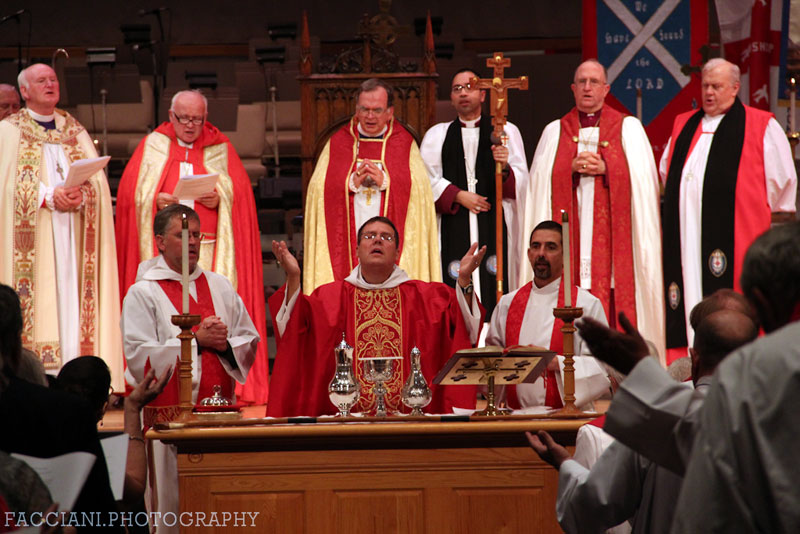
First off, this is not an argument for a certain understanding about the sacraments. I make statements and assumptions that do not speak for IRD as an organization. Primarily, this post is about the hijacking of terms.
During the “violence panel” at CYNKC, Brian McLaren had some notable comments regarding sacraments: “Baptism and the Eucharist can be tools for violence or for peace.” And he said, “Is the Eucharist an altar of sacrifice that made God better or is it a table where the oppressors and oppressed…come to name their oppressions and find forgiveness?…[I believe] the Eucharist table is a gathering of the oppressed and the oppressor. It is where the oppressors can confess their oppression and the oppressed can be validated in their sufferings.”
I’ll tip my hand here and confess that I’m probably the most sacramental, high-churchy guy in the office. As such, McLaren’s commentary caught my interest, especially when McLaren—raised in the Plymouth Brethren—starts using terms like “Eucharist.” Nevertheless, he does not understand this in the traditional sense…especially since he likes tinkering with tradition. I really enjoy interacting with McLaren’s ideas; I could critique the Enlightenment with him all day. I also appreciate how he is trying to reincorporate ritual and community back into the church at large. The way he talks about the importance of liturgy and passing on a Christian narrative to coming generations makes me want to think he’s moved beyond the mere ordinance view of Baptists and the Brethren. However, he’s not accepting Real Presence in the Eucharist, much as he uses similar language.
Notice his rejection of Communion as “an altar of sacrifice.” To someone familiar with the church’s historic understanding and wary of McLaren’s abandonment of low churchly roots, this statement screams, “I’m just making this up as I go along.”
There is a reason why the Communion furniture is called an altar. Despite the many philosophical iterations of what actually happens in the mysteries, all Christians holding to Christ’s real presence understand that His body is broken and His blood is spilled for us—there, as the pastor consecrates the elements. This is possible since the Incarnation means the eternal intrudes into the temporal. We are “partakers of his most blessed Body and Blood.” He was killed as a sacrifice, and we must put our old man to death with Him so that we may also be raised with him. It is concrete. It is physical. It is unmodern, for it is “unenlightened” and “superstitious.” It calls upon the sacrificial understanding shared by pagan and Hebrew alike. It instills in us the fear of God, and in it we are caught up into the heavens with Christ our Mediator.
This is all very icky for the emergents. It means throwing away their own abstracted understandings that they’ve come up with to envision the world. Bread as Body? Wine as Blood? Thanks to the nightmare that is contemporary philosophy and linguistics, this lays constraints upon what metaphysics and epistemologies we can adopt while still remaining orthodox. You see, “modernists” and the “postmodernists” share the same root: an authority problem. Modernists rejected the authoritative claims of the sacred tradition as guarded by the church in favor of individual rationality. Post-modernists, in their many stripes, reject even rationality. Now, postmodern emergents like McLaren go out to “choose the narrative.” In this case, it’s the ones we can pluck from the Bible. I also value the Christian narrative. However, I (and, more importantly, the church universal) believe they are not only mythopoeic (archetypal, thematic, etc.) but also historical. The literal and the metaphorical are fused. A virgin named Mary really truly physically literally conceived a baby boy who was/is literally the God-Man, died (physically), and raised (ditto). All of this evidences the supernatural and miraculous. I carry this same mentality into my sacramental theology.
McLaren is a bit more abstract and airy. He envisions oppressor and oppressed bringing themselves, their experiences, and their sufferings to the altar. The sacrament helps us since Christ was a radical disruptor who made the least greatest and the greatest least. We can have hope that it’s not all wrong, but all shall be well. The powerful killed Him but He won a victory. This should give us meaning and a story with which we orient our lives.
Well, yeah, that is true as well, but is that what it’s ALL about? Certainly not! There’s this big sin problem and it needs a solution generally referred to as salvation. We cannot escape that Christ is crushing the serpent’s head, that the “chastisement of our peace” is laid on him, and a bunch of other warfare-and-sacrifice characteristics that aren’t going away. As I have said before, removing this imagery secures a pacifistic view of Scripture to the point of being dishonest.
What really gets my goat, however, isn’t this ideological turning of the Bible. It’s that McLaren uses the language of sacrament when he’s describing the opposite. The Eucharist and Baptism are not about what I bring to God. As “certain sure witnesses, and effectual signs of grace, and God’s good will towards us,” sacraments are God’s work. It’s not us proving something to God and pulling out some meaning that psychologically helps us (though such secondary characteristics may be there). We are nourished by it spiritually and physically, and we do not feed ourselves. Conversely, McLaren’s theology sounds more like this.
At the altar, we do not come to cope with oppression. We come that “our sinful bodies may be made clean by his Body, and our souls washed through his most precious Blood, and that we may evermore dwell in him, and he in us.”
My recommendation would be this: don’t use terms when you don’t mean them. Don’t call it the sacrament of the Eucharist. Call it a psychotherapy session, or (in line with most non-sacramental Christians) “ordinance.” Emergent theology is already confusing enough without conflating terms.
No comments yet



